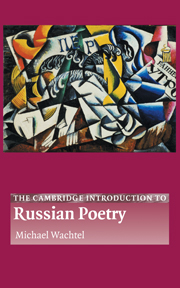Conclusion: poetry and pattern
Published online by Cambridge University Press: 05 June 2012
Summary
С бесчелове́чною судьбо́й
Како́й же спо́р? Како́й же бо́й?
Г. Иванов, «С бесчелове́чною судьбо́й»With an inhuman fate
What argument can there be? What battle?
G. Ivanov, “With an inhuman fate”The specific poetic genres discussed in Part Two were hardly exhaustive. Several equally important genres could be adduced (e.g., religious poetry, the metapoetic poem [poetry about poetry], poetry of the city). And even our chosen genres could be divided into a host of subgenres. The three exemplary love poems (Chapter Six) could all be categorized as poems of jealousy, but there are many other types of love poem: anticipatory (e.g., Fet's «Я́ пришёл к тебе́ с приве́том» [“I came to you with a greeting”]), disappointed (e.g., Pasternak's «Ма́рбург» [“Marburg”]), ecstatic (e.g., Pushkin's «Нет, я́ не дорожу́ мяте́жным наслажде́ньем» [“No, I do not value wild pleasure”]. The chapter on patriotic poetry omitted the substantial tradition of civic verse directed against Russia, e.g., Viazemsky's «Ру́сский бо́г» (“Russian God”), Lermontov's «Проща́й, немы́тая Росси́я» (“Farewell, unwashed Russia”), and most of Nekrasov's verse. A no less vexing problem is that a single poem can combine genres. Blok's «Предчу́вствую тебя́» (“I anticipate you”), discussed in Chapter Three, wavers between love poetry and religious poetry. Pasternak's «Гроза́ момента́льная наве́к» (“A Storm Forever Momentary”) is at once a nature poem and a metapoetic poem (see Chapter Seven). Even the genres that are defined by strict formal characteristics are not necessarily pure (recall Derzhavin's «Фели́ца» [“Felitsa”] in Chapter Four).
- Type
- Chapter
- Information
- The Cambridge Introduction to Russian Poetry , pp. 146 - 155Publisher: Cambridge University PressPrint publication year: 2004

